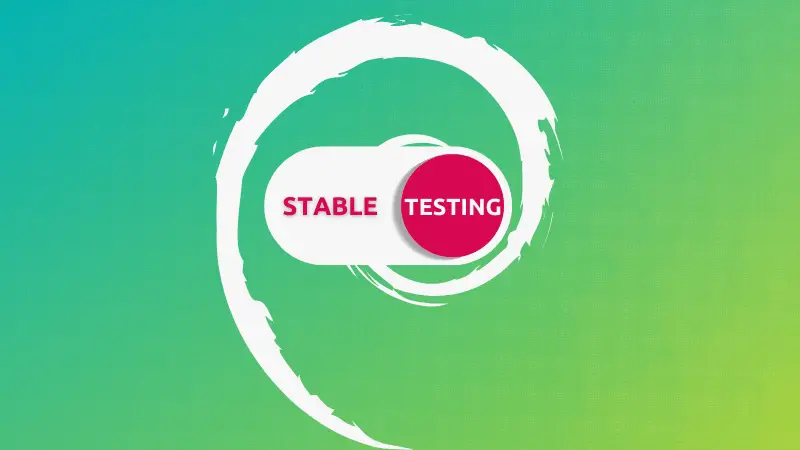Debian Testing vs. Stable: Which Is Right For You?

Debian is a popular Linux distribution known for its stability and wide range of software packages. It offers two main branches: Stable and Testing. Each branch has its own unique characteristics and is suitable for different types of users.

Debian Stable:

- Stability: Debian Stable is known for its exceptional stability. It undergoes rigorous testing and includes only software that has been proven to be reliable.
- Predictability: Stable releases follow a predictable schedule, typically every two years. This allows users to plan upgrades and system changes accordingly.
- Security: Debian Stable receives regular security updates, ensuring that users are protected from known vulnerabilities.
- Suitable for: Debian Stable is ideal for production systems, servers, and workstations where stability and reliability are paramount. It is also a good choice for users who prefer to minimize the risk of encountering bugs and system issues.
Debian Testing:
- Access to Newer Software: Debian Testing is updated on a rolling basis, meaning that it includes the latest versions of software packages as they become available.
- Testing Ground: Testing serves as a playground for testing upcoming changes and packages that will eventually be released in Stable.
- Potential for Bugs: As Testing is a work in progress, it may contain more bugs and unstable software than Stable.
- Suitable for: Debian Testing is suitable for users who require access to the latest software, are willing to tolerate the potential for bugs, and want to contribute to the testing process. It is also a good choice for development systems or experimental environments.
Which Branch Should You Choose?
The choice between Debian Stable and Testing depends on your specific needs and preferences:
- Stable: Choose Stable for maximum stability, predictability, and reliability.
- Testing: Choose Testing if you need access to the latest software, are willing to accept the potential for bugs, and want to participate in the testing process.
If you are unsure which branch to choose, consider your system’s purpose and your risk tolerance. For critical systems, where stability is essential, Stable is the recommended choice. For systems that require the latest software or where you are comfortable with the potential for bugs, Testing may be a better fit.## Debian Testing Vs. Stable: Which Is Right For You?
Executive Summary
Debian offers two main release branches: Testing and Stable. Each branch has its own advantages and disadvantages, and the best choice for you will depend on your individual needs and preferences.
Introduction
Debian is a Linux distribution known for its stability and security. It is widely used on servers and desktops alike, and it is one of the most popular Linux distributions in the world. Debian releases two main versions of its operating system: Testing and Stable. The Testing branch is always up-to-date with the latest software, while the Stable branch is more stable and reliable.
Key Differences
1. Software Updates
- Testing: Receives more frequent updates, including new software versions and security patches.
- Stable: Receives fewer updates, which are mostly focused on security and bug fixes.
2. Stability
- Testing: May be less stable due to the frequent updates and the newer, less tested software versions.
- Stable: More stable due to the less frequent updates and the more thoroughly tested software versions.
3. Software Availability
- Testing: Has access to a wider range of software, including the latest versions.
- Stable: Has a more limited selection of software, but all software is thoroughly tested for stability.
4. Use Cases
- Testing: Suitable for users who want to use the latest software and are willing to accept some potential instability.
- Stable: Suitable for users who prioritize stability and reliability over having the latest software.
5. Support
- Testing: May have less support available, as it is not the main release branch.
- Stable: Has more support available, as it is the main release branch and is supported for a longer period of time.
Conclusion
Ultimately, the best choice between Debian Testing and Stable depends on your individual needs and preferences. If you prioritize stability and reliability, then Stable is a good choice. If you want to use the latest software and are willing to accept some potential instability, then Testing may be a better fit for you.

I’m not sure I understand the difference between Debian Testing and Stable. Can someone explain it to me?
I’ve heard that Debian Testing is more buggy than Stable. Is that true?
I’ve been using Debian Testing for years and I’ve never had any problems. It’s great!
Debian Testing is a waste of time. It’s always breaking.
Oh, so Debian Testing is the perfect choice for people who like to live on the edge.
I’ve heard that Debian Stable is so stable that it’s actually boring.
I’m not sure why anyone would use Debian Testing. It’s like driving a car with no brakes.
Debian Testing is a good choice for people who want to be on the bleeding edge of software development.
I’m not sure I’m brave enough to use Debian Testing. I’ll stick with Stable for now.
I’m excited to try Debian Testing! I’ve heard great things about it.